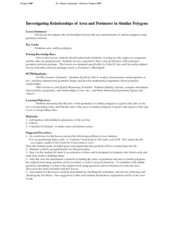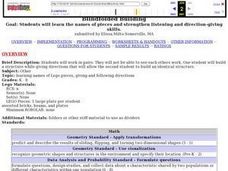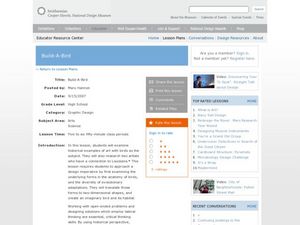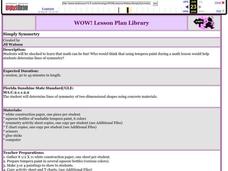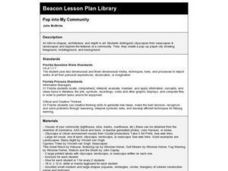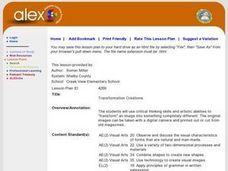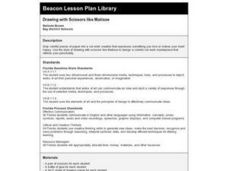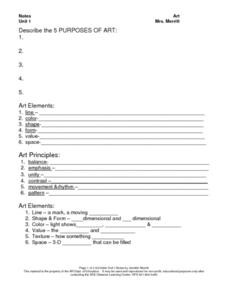Curated OER
Investigating Area and Perimeter of Polygons.
Student sinvestigate the area and perimeter of polygons. They differentiate between similar and congruent polygons.. They identify the ratio and proportions of the sides and angles of polygons.
Curated OER
Blindfolded Building
Pupils build a Lego design and then work with a partner to reproduce that design. They guide the building of the reproduction by description only and then check their work.
Curated OER
Does the Area of the Quadrilateral Change?
Seventh graders complete activities to further their understanding of area formulas. In this area lesson plan, 7th graders watch as the teacher uses Polystrips to model parallelograms. Students find the area of a rectangle and answer...
Curated OER
Net of a figure
In this 3D figure instructional activity, students observe the net of a 3D figure where you open up the figure and tell if it is an accurate representation of that figure. Students complete this for 3 figures.
Curated OER
Build-A-Bird
High schoolers create an imaginary bird. In this anatomy lesson, students analyze how artists represent birds historically, then determine the anatomical aspects that suit a bird to its habitat. Using this information, high schoolers...
Curated OER
Simply Symmetry
Students make pictures with squeeze bottles of tempera paint, and fold the paper to show lines of symmetry. They complete a T chart to showing lines of symmetry. They access a website to complete a symmetry activity.
Curated OER
Perimeter Playground
Young scholars explore geometry by participating in a school measuring activity. In this perimeter lesson, students discuss the techniques and methods used in order to measure a large perimeter or geometric figure. Young scholars utilize...
Curated OER
Angle Exploration and Classification
Students compare and contrast angles and identify them as acute, obtuse, right, or straight angles. They create rays and angles using uncooked spaghetti, read and discuss key vocabulary terms, and complete a variety of geometry worksheets.
Curated OER
How many isosceles triangles can you find?
Seventh graders recognize the characteristics of isosceles triangles. In this isosceles triangle lesson, 7th graders use geoboards to create isosceles triangles. Students record results and explain why they have an isosceles triangle.
Curated OER
Classification
Young scholars explore the observable properties of matter and utilize them in classification. They use a binary classification system to divide objects, then justify their scheme.
Curated OER
Pop Into My Community
First graders distinguish cityscapes from seascapes and landscapes and explore the features of a community. Then, they create a pop-up paper city showing foreground, middle ground, and background.
Curated OER
Shadow Puppets
Students examine the role of shadow puppets. They create their own puppet and put on a play.
Curated OER
The Castle
Students build a castle to Ravi's design using the cubes. Students then make an original model of a solid object from diagrams which show views from the top, front, side and back. Students describe the reflection of rotational symmetry...
Curated OER
Beautiful Butterfly Tiles
Third graders create a butterfly drawing that includes the elements of art and principles of design. They create artwork that can be made into ceramic tiles to be installed around the classroom doorways in our new addition.
Curated OER
Applied Science - Science and Math Post-Lab
Students explore optical illusions. In this Applied Science lesson plan, students view optical illusions and record the data of what they see. Students graph the data that they collect.
J. Paul Getty Trust
Expressing Emotions through Art Lesson 4—Everybody Celebrates
Students create a celebratory hat after viewing images of artwork depicting people celebrating an event. In this artistic perception lesson plan, students discover why people celebrate their accomplishments and how to express feelings...
Curated OER
What are the Kinds of Triangles?
Fifth graders classify triangles. In this triangle lesson, 5th graders learn about the characteristics that make up a triangle. They are instructed through video, PowerPoint slides, and teacher-led demonstrations.
Alabama Learning Exchange
Transformation Creations
Learners "transform" an image into something completely different using critical thinking skills and artistic abilities. They improve skills in using digital cameras and word processors.
Curated OER
Mr. Bo Jangle, What's Your Angle?
Third graders explore angles. In this geometry lesson, 3rd graders identify and define acute, obtuse, and right angles. Students form angles with their bodies, find angles in picture books, and record angles found outside in their math...
Curated OER
Drawing With Scissors Like Matisse
Students study the life and art style of Henri Matisse. They view various prints from his early and late art styles. Then students draw something they enjoy and cut out pieces of colored construction paper and glue them onto pieces of...
Curated OER
Notes Unit 1: Art Fundamentals
Here is a guide for your middle schoolers to use while you are providing a lecture on the basics of art. They use this worksheet to aid them as they take notes on the purpose of art, art elements, properties of art, and art principles....
Curated OER
Perfectly Puzzling Pentominoes
Second graders utilize manipulatives (pentominoes) to demonstrate knowledge of: lines of symmetry, slides, reflections (flips), rotations (turns), area, and perimeter. This instructional activity gives students a meaningful way to...
Curated OER
Who Wants to Carry a Million?
Students, in groups, determine the volume of a box large enough to hold a million dollars. They calculate the dimensions of a bill and the volume of the money.
Noyce Foundation
Parallelogram
Parallelograms are pairs of triangles all the way around. Pupils measure to determine the area and perimeter of a parallelogram. They then find the area of the tirangles formed by drawing a diagonal of the parallelogram and compare their...
